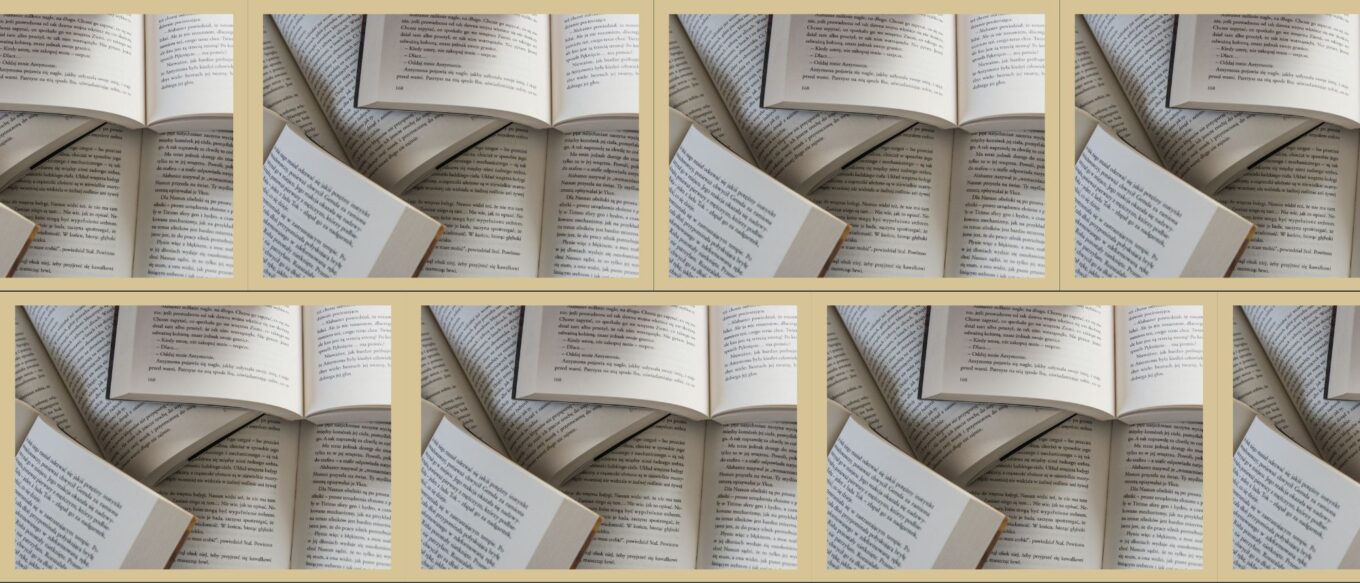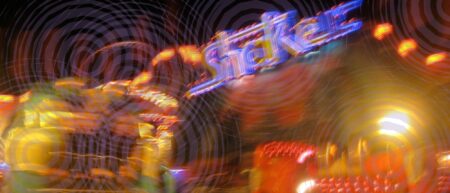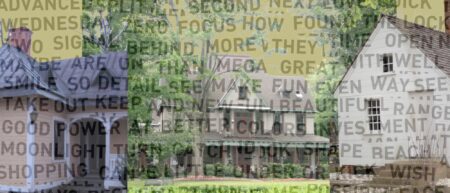Here’s what the editors of true enjoyed in 2023! We’d love to hear what you’ve been reading, so please feel free to add yours in the comments.
Books
Happily, by Sabrina Orah Mark. Mark’s essay “Fuck the Bread. The Bread Is Over” went viral in the early days of the pandemic, when we were desperate for yeast and flour and some semblance of meaning in a world that just seemed chaotic. Like all of the essays in Mark’s column “Happily” in The Paris Review and essay collection of the same name, “Fuck the Bread” brings together Mark’s thoughts on motherhood and her life as a writer and teacher with fairy tales and mythology. The result are lovely lyric essays that do bring meaning to a chaotic world. –Kristina
Go Back and Get It, by Dionne Ford. Dionne Ford’s Go Back and Get It is an honest and moving memoir of intergenerational trauma and healing. Ford finds a photograph of her ancestors and realizes that her great-great grandmother had a relationship with her enslaver, from which her great-grandmother was born. She wants to know more about this but is hindered by her own experience with sexual abuse and alcoholism. When she finally meets her white cousins, she realizes how much they are gatekeeping the family history and that she’ll have to do the research herself. The story she tells explores the lives of her ancestors without making anything up. And her search is always honest, looking at herself and her relatives (white and Black) and their motivations. –Kristina
Above Ground, by Clint Smith. I first came to know Clint Smith’s writing through his 2021 nonfiction book, How the Word is Passed: A Reckoning With the History of Slavery Across America. His candor, his voice, his insightfulness and willingness to share it by way of beautifully written words, make him an author I want to read again and again. So, I grabbed Above Ground, Smith’s second award-winning book of poetry, as soon as it was released in March 2023. This poetry collection is another kind of reckoning, that of life as a Black father in a country–a world–intent on perpetuating myths and inaccuracies about racism. In it, Smith explores the rollercoaster of becoming and being a parent—the worry, the joy, the pride, the fear, and how children can bring us to our highest highs and our lowest lows, often within minutes. Through poems addressed to his children, Smith captures the complexity of the human experience and speaks aloud and with incredible clarity the effects of slavery on his family. Smith has a gift for making his lived experiences accessible for those of us who have different ones, nestling what can seem disparate into the lines of a poem that touches on something so familiar. –Megan
Woodsqueer: Crafting a Sustainable Rural Life, by Gretchen Legler. I was gifted Woodsqueer by my former colleagues in the English Department at McDaniel College in Maryland, which is to say this is not a book I would necessarily have picked for myself but that I am so happy to have found! In this intense, brutal, and absolutely reverent and loving collection of essays, U of Maine creative writing professor Gretchen Legler memorializes the rituals and realities of agrarian rural life. While the focus of the collection is on how Legler and her partner Ruth actually made a life together on hundred of acres of land in rural Maine (think: hunting and processing deer, felling trees and splitting the wood to heat their home, salvaging a beaver carcass to save its pelt, and slaughtering chickens humanely and respectfully to honor their contribution to the sustainability effort), Legler weaves memoir in an almost breadcrumb-like manner, somehow managing to leave us with an impression not only of her current life but of the lives that came before—all of which led her to the woods. Peppered with hand-drawn illustrations, Woodsqueer is a charming, amusing, and reflective work that educated me and made me long for simpler times. –Megan
Things We Didn’t Talk About When I Was a Girl, by Jeannie Vanasco. Vanasco opens her 2019 memoir by admitting, “I already predict failure.” And why wouldn’t she? In her second book, Vanasco examines, in close detail, the moment a close friend sexually assaulted her. In an attempt to understand her experience better, Vanasco tracks down, interviews, and includes the man that raped her in the book. Her doubt that the book’s central premise will work, that her central character will agree to an interview, or that she herself can successfully write the book creates an almost meta-narrative throughout. Reading Things We Didn’t Talk About is akin to ricocheting between ideas, structures, voices, and mediums. Vanasco delicately recreates scenes from memory, but folds between those pages transcripts and commentary. In effect, we see multiple Jeannie Vanascos on the page: the trusting friend, the sexual assault survivor, the writer, the interviewer, the educator, the partner, and the human trying to stitch all these personas together. The book is a masterclass in writing about writing, in exploring the truth, and in deciding whose story gets told, and how. –Brandon
Tomboy Survival Guide by Ivan Coyote. Poignant, laugh-out-loud level funny, and unique, Tomboy Survival Guide is a memoir that struck me in the heart. You needn’t be a former (or current) tomboy to learn from this survival guide. Coyote’s narrative and experience ring true for anyone who yearns for acceptance from oneself and others, regardless of gender. –Fern
Articles
“The Unlikely Posthumous Life of a Prodigy’s Typewriter” by Diego Courchay. I am totally biased in liking this essay, since Stig Dagerman’s daughter Lo is a close family friend and I’ve watched her explore and write about her father’s legacy in recent years. But I’d like to believe that I would love Courchay’s essay about Dagerman no matter what. He does what I love to see in writing, effortlessly blending his love for the Swedish writer with an object of material culture (Dagerman’s typewriter), a search for meaning behind that typewriter, and the story of Dagerman’s rise to prominence while dealing with the “crushing weight of expectation and self-doubt,” something all too familiar for too many writers. –Kristina
“Ghosts” by Vauhini Vara. From its onset, artificial intelligences like ChatGPT have sent waves of existential dread through creative spaces. How soon, we’ve wondered, will we be out-written or out-edited by an AI? Some writers and artists often eased these fears by zeroing in on what we could do that machines could not: capture the human experience. Vara’s essay “Ghosts” (originally published on August 9, 2021) is a stunning combination of the human element and AI writing. Unable to write about grief, Vara prompts ChatGPT to write an essay for her. Over nine variations of prompting and editing, what Vara creates is the human experience. “Ghosts” is one of those essays that, to me, claims a unique approach that can’t be replicated again, which in the face of AI writing is a soothing balm to my creative fears. –Brandon
“Notes from Prince Harry’s Ghostwriter” by J. R. Moehringer. I can think of few writing jobs more maligned than ghostwriting. How many best-selling-celebrity memoirs, Prince Harry’s Spare among them, were written by someone else? All of them? Most? Certainly enough to cast doubts. In his essay on ghostwriting Spare, Moehringer exposes readers to the art of ghostwriting and builds a compelling case for why ghostwriting exists at all. “…ghostwriting is an art,” he insists, “[don’t] let those who cast it as hacky, shady, or faddish (it’s been around for thousands of years) dim their pride.” Moehringer’s essay is a deep exploration into craft, relationships, and the consequences of accidental celebrity. He blends memoir and reporting, narrative and scene, to answer a nuanced question: is ghostwriting good? –Brandon
Podcasts
“Body Electric” by NPR, Hosted by Manoush Zomorodi. This podcast, paired with a study involving listeners and in collaboration with Columbia University, has the dimension and real-life application required to captivate its information-age audience. Body Electric is a series on the ways that the human body and technology interact and the unconscious adaptations we have made to integrate. In a wide body of similar podcasts, this series stands out with hope and a change-centered outlook. –Fern
—
true’s editors include:
Brandon Arvesen is an Assistant Professor of Writing at Colby-Sawyer College. Brandon is the founding editor of 3cents Magazine, an online publication that puts three independently written pieces into thematic conversations. His reported memoir on American gambling is in process.
Fern Moore is a multi-disciplinary artist and currently a student at Goucher College, and true’s digital intern. He craves and creates material that explores sensitive topics with both grace and crass. His work can be seen in The Preface, Space on Space, and various galleries in Baltimore.
Kristina Gaddy writes all kinds of nonfiction, from reportage to lyric essay, and is the author of Well of Souls: Uncovering the Banjo’s Hidden History and Flowers in the Gutter: The True Story of the Edelweiss Pirates, Teenagers Who Resisted the Nazis.
Megan Reilley was an editorial professional for more than 20 years before joining the faculty of The Pennsylvania State University as an Associate Teaching Professor of English. Her memoir examining societal and personal expectations of female identity, mothering, female bodies, and the bodies of our children, is in progress.



